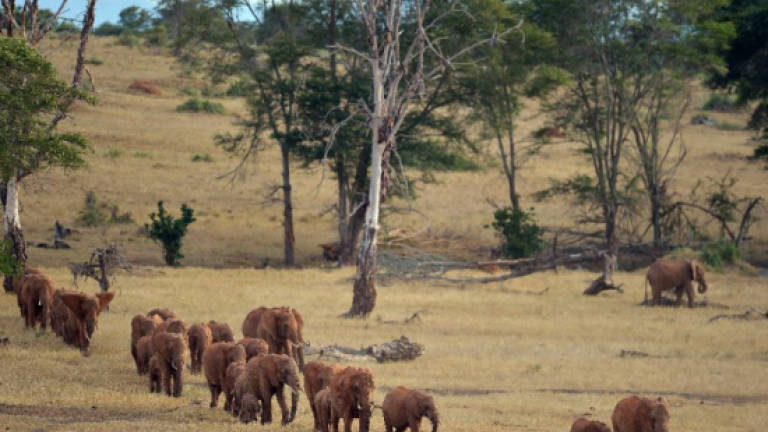Elephants hide by day, forage at night to evade poachers

LIKE escaped convicts, elephants in eastern Africa have learned to travel at night and hide during the day to avoid poachers who are hunting tuskers into extinction, researchers reported Wednesday.
Normally elephants forage for food and migrate in daylight, while resting under cover of darkness.
But a sharp increase in illegal hunting driven by the global trade in ivory has forced the massive land mammals — against their nature — to upend their usual habits.
"As most poaching occurs during the daytime, their transition to nocturnal behaviour appears to be a direct result of prevailing poaching levels," said Festus Ihwagi, a researcher at the University of Twente in The Netherlands.
In an upcoming study, Ihwagi details his findings, based on data gathered from 60 elephants in northern Kenya tracked with GPS devices for up to three years during the period 2002 to 2012.
Working with the NGO Save the Elephants, which has fitted more than 100 of the animals with GPS collars, Ihwagi monitored the movements of 28 females and 32 males in and around the Laikipa–Samburu ecosystem.
Females live in close–knit families and often have young calves at their side, while bulls tend to be more solitary.
To determine how, and to what extent, poaching had changed elephant behaviour, he compared two sets of data.
The first measured the distances travelled during the day and at night, and was logged as a ratio between the two.
The second — drawing from the Illegal Killing of Elephant programme database — identified zones and time periods when poaching was more or less severe.
Slaughtered for ivory
"Simultaneous elephant tracking and monitoring of causes of death presented a perfect 'natural laboratory'," said Ihwagi.
The nighttime movements of the elephants increased significantly in sync with poaching levels, especially for females.
In high–danger zones, females reduced daytime activity by about 50% on average compared to low–danger zones, Ihwagi told AFP.
Changing their behaviour in this way may help keep elephants alive in the short run, but could have long term implications for their survival, he added.
Despite their intelligence, deeply ingrained foraging strategies and mating patterns developed on an evolutionary timescale may limit the capacity to adapt.
"For mothers with very young calves, the risk of predation of the calves by lions or hyenas would be higher at night," Ihwagi said.
"For the mature elephants, it implies an alteration of their normal social life."
The real–time data from GPS devices could be used as an early warning system to alert environmentalists and park rangers, the researchers noted.
A sudden uptick in nocturnal travel, for example, could signal that elephants feel threatened.
According to the International Union for Conservation of Nature (IUCN), the number of African elephants has fallen by around 111,000 to 415,000 over the past decade.
The killing shows no sign of abating with around 30,000 elephants slaughtered for their ivory every year, mainly to satisfy demand in the Asian market for products coveted as a traditional medicine or as status symbols.
"The escalation of poaching has become the greatest immediate threat to the survival of elephants," Ihwagi said.
The findings will appear in the January issue of the Journal of Ecological Indicators. — AFP